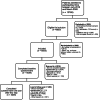Associations Between Social Economic Determinants and Long-Term Outcomes of Critically Ill Patients
- PMID: 39945587
- PMCID: PMC11952688
- DOI: 10.1097/CCM.0000000000006587
Associations Between Social Economic Determinants and Long-Term Outcomes of Critically Ill Patients
Abstract
Objective: Differences in socioeconomic status (SES) may influence long-term physical, psychological, and cognitive health outcomes of ICU survivors. However, the relationship between SES and these three long-term health outcomes is rarely studied. The aim of this study was to investigate associations between SES and the occurrence of long-term outcomes 1-year post-ICU.
Design: Prospective cohort study.
Setting: Seven Dutch ICUs.
Patients: Patients 16 years old or older and admitted for greater than or equal to 12 hours to the ICU between July 2016 and March 2020 completed questionnaires, or relatives if patients could not complete them themselves, at ICU admission and 1 year after ICU admission.
Interventions: None.
Measurements and main results: Validated scales were used for the outcomes: physical problems (fatigue or ≥ 3 new physical symptoms), psychological problems (anxiety, depression, or post-traumatic stress), cognitive impairment, and a composite score. Occurrence of outcomes were calculated for: origin, education level, employment status, income, and household structure. Adjusted odds ratios (aORs) were calculated with covariates age, gender, admission type, severity-of-illness, and pre-ICU health status. Of the 6555 patients included, 3246 (49.5%) completed the questionnaires at admission and after 1 year. Low education level increased the risk of having health problems in the composite score 1-year post-ICU (aOR 1.84; 95% CI, 1.39-2.44; p < 0.001). Pre-ICU unemployment increased the risk of having physical problems (aOR 1.98; 95% CI, 1.31-3.01; p = 0.001). Migrants and low income was associated with more psychological problems (aOR 2.03; 95% CI, 1.25-3.24; p < 0.01; aOR 1.54; 95% CI, 1.10-2.16; p = 0.01, respectively), and unpaid work with less psychological (aOR 0.26; 95% CI, 0.08-0.73; p = 0.02) and cognitive (aOR 0.11; 95% CI, 0.01-0.59; p = 0.04) problems.
Conclusions: Indicators of lower SES, including low education level, low income, unemployment and migrants were associated with an increased risk of post-ICU health problems. Gaining insight into the complex relationship between SES and long-term health problems is necessary to decrease disparities in healthcare.
Trial registration: ClinicalTrials.gov NCT00324633.
Keywords: intensive care; patient-reported outcomes; social determinants of health; socioeconomic status.
Copyright © 2025 The Author(s). Published by Wolters Kluwer Health, Inc. on behalf of the Society of Critical Care Medicine and Wolters Kluwer Health, Inc.
Conflict of interest statement
Dr. van Sleeuwen received funding from Radboud University Medical Center; they received support for article research from Radboud University Medical Center. Dr. Koeter’s institution received funding from ZonMw; she received support for article research from ZonMw. The remaining authors have disclosed that they do not have any potential conflicts of interest.
References
-
- Oakes JM, Rossi PH: The measurement of SES in health research: Current practice and steps toward a new approach. Soc Sci Med. 2003; 56:769–784 - PubMed
-
- Marmot M, Stansfeld S, Patel C, et al. : Health inequalities among British civil servants. Lancet. 1991; 337:1387–1393 - PubMed
-
- Koopman C, Bots ML, van Oeffelen AA, et al. : Population trends and inequalities in incidence and short-term outcome of acute myocardial infarction between 1998 and 2007. Int J Cardiol. 2013; 168:993–998 - PubMed
-
- van den Muijsenbergh M, Oosterberg E, Zorg voor migranten, laaggeletterden en sociaal kwetsbaren in de huisartsenpraktijk. Chapter 11.1 NHG/Pharos Utrecht. 2016
MeSH terms
Associated data
LinkOut - more resources
Full Text Sources


